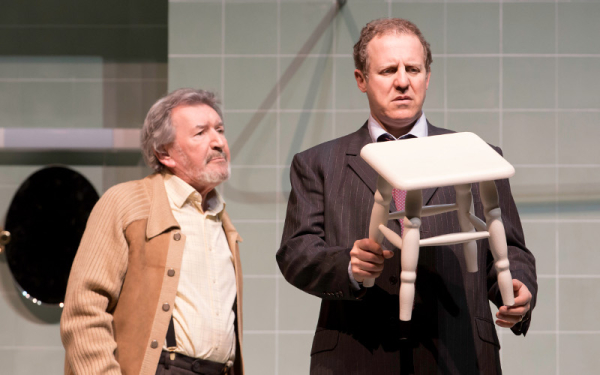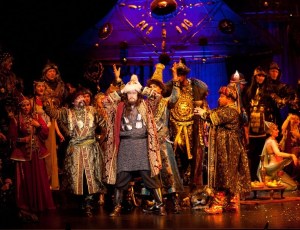Michael Coveney: Actors speak up on stage and page, Gielgud biographer snaps back
Actors themselves usually provide the greatest insights on their own performances

© Johan Persson
It is a truth universally unacknowledged that most actors have more interesting things to say about their own work than most critics. I never say too much in my own defence as a critic but I will say this: like little Ronnie Corbett in the famous television sketch about class, I know my place. There is nothing a critic says about a production that a half-way intelligent actor, or indeed director, does not know already.
And anyone who comes along to the WhatsOnStage post-show discussions will see this for themselves, as the actors always have something worthwhile to say. Always. What a critic can do is put all that in some kind of context and descriptive framework and, of course, supply the reader or the listener with the information in as entertaining a way as possible, the bad news as well as the good news.
For there is no right or wrong about criticism. One's reaction to plays and musicals is always, in the first place, chemical. And there was something hard to put your finger on about last night's National Theatre opening of A Small Family Business. So hard, that several people I talked to afterwards felt they'd seen a minor Ayckbourn play, which is palpably not the case. It was not a deliriously funny evening. Then again, I don't always laugh at farce; I get anxious about plot, and farce, anyway, as Ray Cooney himself once said, is a very serious business.
No, there was some x-factor missing from Adam Penford's revival. Something not in the air about it. It might have been the acting not quite clicking into gear or, as I suggest in my review, perhaps that acting was not colourful enough. Penford himself, a staff director who has assisted Nicholas Hytner on One Man, Two Guvnors, is very inexperienced for so big a challenge.
Someone even suggested to me that the play had dated. Well, so has Medea. Dated, in the sense of past a sell-by date, is often a lazy way of not engaging with the history of the play, or the time it represents. We're sometimes in danger of saying "dated" when we mean "period." One reviewer has even diagnosed the datedness and failure (as far as he was concerned) of Julian Mitchell's Another Country as a symptom of the fading notoriety (again, as far as he was concerned) of the Cambridge spy Kim Philby; and this in a week when I've read multiple reviews of two new books about him.
So it will be interesting to see and hear what "Jack and Poppy" from A Small Family Business, aka Nigel Lindsay and Debra Gillett, both highly intelligent actors, have to say about their experience on the play when they take part in a National Theatre Platform on 26 June. And either side of that date, there are NT Platforms with Lesley Sharp and Kate O'Flynn on A Taste of Honey on 9 May, and with Aidan McArdle and Ronan Raftery talking about the upcoming revival of Sean O'Casey's The Silver Tassie (a really great play) on 3 July.
Meanwhile, I've been reading a fascinating anthology of essays called Shakespeare and Me, edited by the American author and academic, Susannah Carson. And aside from professional Shakespeareans and intellectual heavyweights, we have actors writing as well as any of them: Eve Best on her performances of Lady Macbeth and Beatrice at the Globe, Harriet Walter on what she calls triangular tensions in the plays, Ralph Fiennes on the virtues of Shakespeare in the cinema, Antony Sher on how he overcame a sense of trespassing on Shakespeare (as "a short, bespectacled, Jewish South African"), Brian Cox on why The Taming of the Shrew is not a misogynist comedy and Tobias Menzies on the use of madness as a disguise in both Hamlet and King Lear.
Then there is Rory Kinnear, absolutely brilliant on playing Angelo in Measure For Measure at the Almeida and Hamlet at the National, and thirty-five pages by James Earl Jones on the character of Othello; and he should know, he's played him seven times across three decades.
John Gielgud once said to me that actors were so clever nowadays. "They all write books… Sher and Shallow… I mean, Callow." And so on. And it's true that many of our most visible leading actors now have university degrees: Simon Russell Beale, Best, Imogen Stubbs, Kinnear. But you don't have to have a degree to be clever, nor are you necessarily clever with one, either.
Gielgud always put his own intelligence down and said that all he knew or cared about was the theatre. And that, of course, he knew inside out, although I don't think he ever really wrote about it as penetratingly as Sher or "Shallow," say, or even Eve Best or Harriet Walter. One of his biographers, Jonathan Croall, has published a new book, In Search of Gielgud, in which he picks over the problems he had getting his main opus published.
Chief obstacle was his rival, the late Sheridan Morley, who actually tried to put him off the scent altogether as he claimed to be Gielgud's "authorised" biographer. Anyway, they both published, Croall pipping Morley to the post by six months. He also pipped him to the post in terms of accuracy, reliability, analysis and critical appreciation. A lot of the new supplementary book is in diary form, full of gossipy related titbits about what the post brought that day, what Claire Tomalin said about the business of biography, lunch with his publisher, and so on… and a running theme of Morley's latest dastardly wheeze to scupper his project.
It's all rather bitchy and highly entertaining, not least the relentless exposure, at the end, of every single slip and error in Morley's text. Morley wrote the first definitive and outstanding biography of Noel Coward (although that has been eclipsed, in my view, by Philip Hoare's biography) but his Gielgud suffered from being too long in the writing with his own health failing. The result is that Croall won the day hands down.














